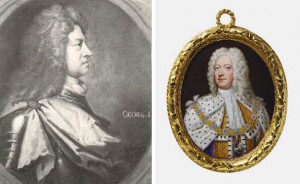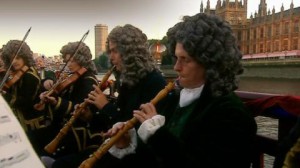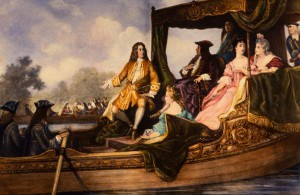Falling Down the Thames Blog 30, 08th October 2014
Music to Paddle By
The year 1717 didn’t start well for King George I. He had been on the throne for just three years, but a certain someone was keen to take the seat from him. There was tension between George and his son, the Prince of Wales. It seems that the prince had gathered the support of many influential men in London, and that this support extended to Parliament, which impeded the work of the King’s ministers. George’s son was being a pest. It was time for George to take action. He needed to make a mark. He needed to throw some parties.
For the rich and famous residents of London, the summer of 1717 was marked by three months of festivities, including extravagant receptions at Hampton Court. The beginning of this merriment was a concert on the River Thames. Not just any concert, but the performance of special work composed for the occasion.
Or perhaps not. It is not clear whether George Frideric Handel composed Water Music specifically for the King’s party, or whether he cobbled together an assortment of pieces that he had been working on. Regardless, Handel’s Water Music was an instant success.
It was first performed on the evening of Wednesday 17 July, 1717. King George and a substantial retinue of English nobility took to barges on the River Thames at Whitehall, and sailed upriver as far as Chelsea where they stopped for a meal. The party then sailed back downstream. According to biographer Anthony Hicks, His Majesty arrived home at St. James’s Palace at half-past four in the morning. A report in the Daily Courant explained that one of the barges contained fifty musicians who provided a magnificent presentation of the suite of movements: “which is Majesty liked so well, that he caus’d it to be plaid over three times in going and retuning.” The Prince of Wales was not in attendance.
I close my eyes, and try to imagine the scene. Trumpets, oboes, bassoons, recorders and horns, all bellowing out into the night. It is said that double the usual number of violins and woodwinds were employed so that their contribution wouldn’t be lost in the open air. Upriver on a floodtide, and then back downstream on an ebb tide. The work was so appealing that it was soon heard in London’s theatres, concert halls, and even taverns.
Even now, nearly three hundred years later, I suspect that the Water Music’s Alla Hornpipe from the Suite in D / G major would be recognized by almost everyone, if only because it has been used in so many television advertisements.
Krista and I chose the Common Kingfisher to be our mascot for our 2015 paddling adventure, Falling Down the Thames. We have chosen Handel’s Water Music to be our musical accompaniment.
By my reckoning, there is distance between Whitehall and Chelsea is just shy of three kilometres. Krista and I will be paddling that section of the River Thames on Wednesday 29 April. Krista will be listening to me whistle a medley of movements from Handel’s Water Music. What a lucky girl.
- Glen
Photo credits: King George I - www.nndb.com; George II, Prince of Wales - www.apollo-magazine.com; George Frideric Handel – www.classicfm.com; Handel discussing Water Music with King George I and his retinue, on the royal barge – painting by Edouard Hamman, found at karina-lumeanoastra.blogspot.com




